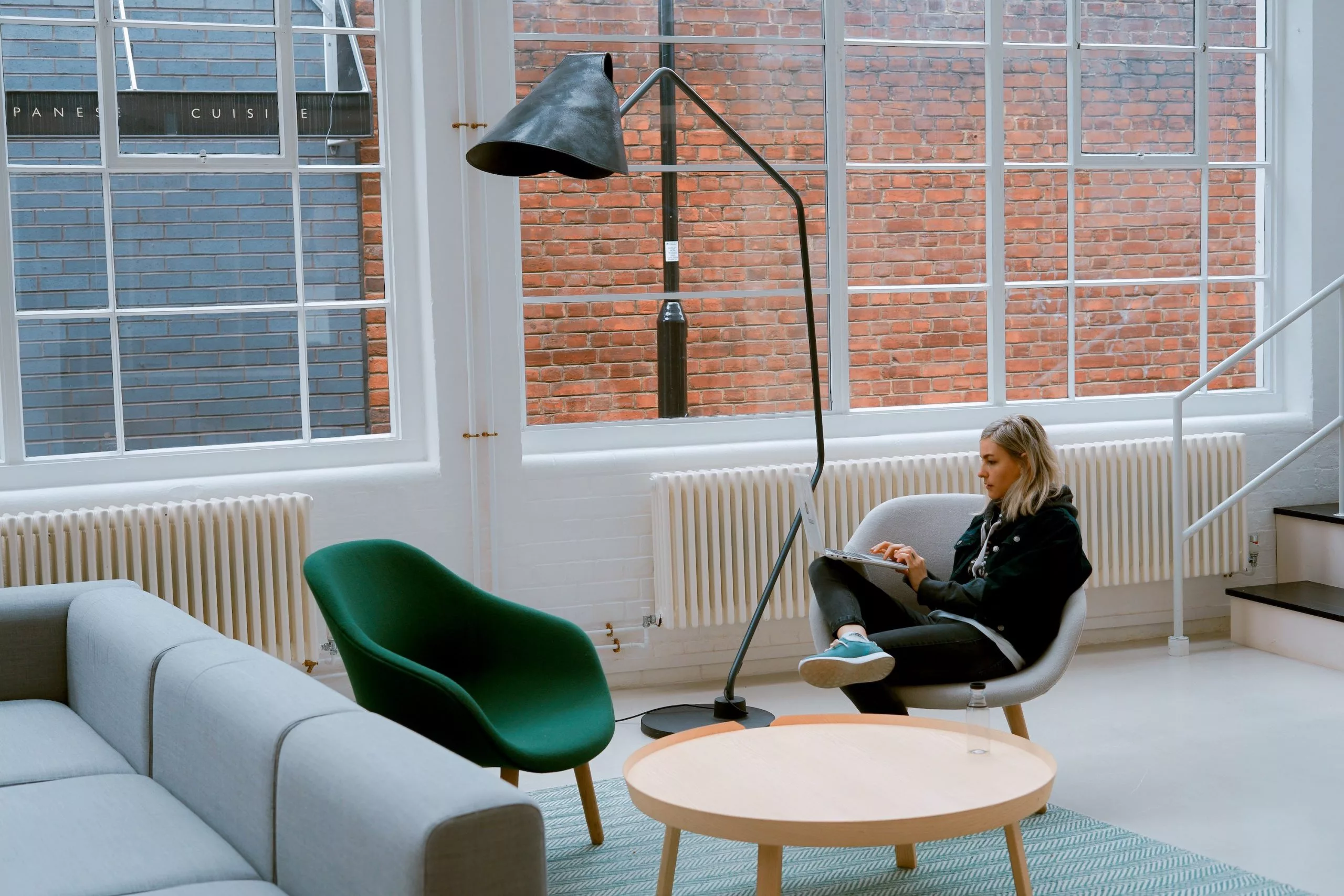After years of defining myself by my accomplishments and allowing my career to consume me, the flying buttress of work ceased to prop me up, and I fell apart. Mentally exhausted and spiritually dead, I slumped in my airplane seat. When the flight attendant asked if I needed anything, I waved her away. I had lost so much weight I looked like a refugee from Dachau. During liftoff, I didn’t care if the plane crashed. Nothing mattered. At the lowest point in my life, I had booked a sunny week in Jamaica to escape the pain of emotional stress and physical burnout.
When you live only in the external world like I did — immersing yourself in your career and ignoring your inner self — you’re bound to hit a bottom at some point. There was a time when I needed my work — and hid it from others — the way my alcoholic father needed and hid his bourbon. And just as I once tried to control my father’s drinking by pouring out his booze and refilling the bottle with vinegar, the people who love me pleaded and tore their hair out trying to keep me from working all the time.
At my lowest point, I got help, started my own mindful practices, and began the climb out of the work fog into a saner life. Instead of Saturdays in my basement office, I looked forward to weekends of gardening, garage sales, browsing at the farmer’s market, watching the birds at the birdfeeder, and meditative quiet. I enjoy and savor that time as much as I had once savored my mindless working. Today when I work, I’m constantly attuned to what’s going on inside me as I pace myself in the present moment throughout the workday. Without an internal compass, you rely on outer conditions to fix an internal feeling, and your spirits die. Could you be one of the spiritually dead in desperate search of an outside cure for your work woes?
Mindless working: The real American idol
In a society based on mindless working, my old unhealthy work habits had plenty of camouflage. Flextime, 24-hour Walmarts, smartphones, and Wi-Fi have vaporized the line that once kept the office from engulfing the sacred hours of Shabbat, Sunday, and the family dinnertime. In a rapidly changing, turbulent world you, too, might be struggling to hold that line between calm and frantic work activity.
The technological revolution has produced fast-paced, clever work gadgets that infiltrate personal time and a technologically-driven work culture that has spun our lives into a blur of constant doing, eclipsing our ability to be. The phrase “24/7,” household slang of the 21st century, has replaced the “9-to-5” dinosaur adage of the 1990s. These trends indicate how the constant demand of work has slithered its way into our personal space — capturing our thoughts. According to Harvard researchers, if you’re like the average person, you’re lost in thought 47 percent of the time. And multitasking keeps you stuck there. As technology continues to erase the lines and accelerate your life, you face the risk of losing touch with yourself, the present moment, and the people around you.
If you’re a mindless worker, you’re disconnected from yourself and see work as a haven in a dangerous, emotionally unpredictable world. You’re on automatic pilot, allowing work tasks to engulf you, eclipsing other quarters of life: sales reports litter dining tables; desks are covered with dinner plates; commitments to self-care, spiritual life, household chores, friends, partners, and children are frequently made and broken to meet work deadlines. You seek an emotional and neurophysiological payoff from frantic working and get an adrenaline rush from meeting impossible deadlines.
Your work appetite is insatiable, occluding awareness of self, others, and physical surroundings. You’re preoccupied with work no matter where you are — walking hand-in-hand at the seashore, playing catch with a child, or fishing with a friend. Any kind of inner awareness is little more than a vague, if pleasant, backdrop. Your relationship with work is the central connection of your life — the place where “life” really takes place, the secret repository of drama and emotion, as compelling as the one addicts experience with booze or cocaine.
What is mindful working?

Bryan E. Robinson, Ph.D. is a licensed psychotherapist and author of numerous books including his latest, #CHILL: Turn Off Your Job and Turn On Your Life.
Most approaches to job stress, work addiction, and workplace problems impose change from the outside in. Sometimes this works, but more often it doesn’t. The practice of mindfulness brings about change from the inside out, regardless of workplace circumstances or the nature of job problems. I call this simple solution to an epidemic problem facing the American workforce mindful working — the intentional, moment-to-moment awareness of what’s happening inside of you and immediately around you with self-attuned compassion as you move through daily work schedules and routines. It involves bringing your full non-judgmental attention to body sensations, thoughts, and feelings that arise while working or thinking about your job. Instead of attacking yourself when things fall apart, a mindful, self-compassionate attunement eases you through work stress and burnout, business failures, job loss, or worry and anxiety about career goals.
Mindful working is based on loving kindness toward yourself during the best of times and the worst of times. When you worry, stress out, or get depressed about a downturn in the economy, loss of a promotion, a faltering relationship with a boss or colleague, or fear of an upcoming job challenge, it creates misery. Worry and stress feed dread and uncertainty. When the mind ruminates, the worry and stress eclipse the problematic situation. You become highjacked by the internal suffering — a magnification of the original situation. In these instances, your mind uses you. But when you practice mindful working, you use your mind to navigate workplace woes with clarity, self-compassion, courage, and creativity.
My research team at the University of North Carolina at Charlotte compared a sample of 109 workaholics with non-workaholics. Across the board, workaholics showed the qualities of the mindless worker. They had statistically higher burnout rates, were more disconnected from their inner selves, and had less self-insight than non-workaholics. Whereas workaholics were more controlling and impaired in their communication, non-workaholics showed more soul-like qualities of the mindful worker such as clarity, compassion, calmness, and confidence. And it’s no wonder, because workaholics focus — for the most part — outside themselves on the tsunami of work that they take on. Although I call this mindless working, you don’t have to be a workaholic to work mindlessly.
If you’re a mindful worker, you’re more attuned to yourself and experience your job as a necessary and sometimes fulfilling obligation. You have present-moment awareness of your thoughts, emotions, and what you’re feeling in your body as you navigate the workday. You know when to close the briefcase, mentally switch gears, and be fully present in the moment — at your daughter’s soccer game or the celebration of your wedding anniversary. Your inner attunement gives you a payoff of calm and confidence that brings a sense of satisfaction and joy to your career. You can turn off your work appetite, pay attention to your surroundings, and you’re as emotionally present in off-work times as you are during work hours.
Scientists have discovered that mindfulness practices slow down heart rate and brainwave patterns and boost the immune system and cardiac functioning. Studies also show that people who meditate live longer and have less stressful lives, fewer health problems, and improved relationships. Mindfulness allows you to appreciate the deep mystery of being alive without the need for work highs or numbing yourself with multitasking and busy pursuits.
Quiz: Are you a mindful worker or a mindless wreck?
Has your job become an invisible leash that leads you around 24/7, causing you to lose touch with who you are? Or do you stay mindfully attuned to your needs throughout the workday, protecting your personal time by putting the job aside when necessary? Grade your work mindfulness by answering yes or no to the following questions regarding your typical workday:
- Do you crack the whip, driving yourself with anxiety and worry?
- Is it hard for you to get work off your mind when trying to relax?
- Do you berate and punish yourself when you fall behind schedule?
- Does working too much ever interfere with your personal relationships?
- Are you more task-focused than self- focused as you move through the workday?
- Is your mind more centered in the past or future than in the present when you’re working?
- Do dread and anxiety overwhelm you during or before going to work?
- Do work projects move too slowly or not get completed fast enough to suit you?
- Are you more interested in the finished product than in what’s happening on the inside of you?
- Do the pace and demand of work trump personal attention to physical and emotional needs?
- Are you more compassionate than irritated with yourself when things fall apart?
- Do you maintain a satisfying connectedness with yourself and others while working?
- Do you have frequent bursts of creativity and expressions of joy on the job?
- Do you work more from confidence than from fear?
- Does your curiosity trump the tendency to judge and blame yourself or others when mistakes are made?
- Do you have a sense of clear- mindedness and direction on the job?
- Are you able to stay calm and worry-free instead of racing against the clock?
- Do you enjoy the process of your work as much as reaching the final outcome of a project?
- Do you protect private time by preventing wireless devices from interfering with personal relationships?
- Are you able to let things happen at a reasonable pace instead of make them happen?
Scoring: Start with 60 points. Subtract 2 points for each “yes” answer to questions 1 through 10. Add 2 points for each “no” answer to questions 1 through 10. Subtract 2 points for each “no” answer to questions 11 through 20. Add 2 points for each “yes” answer to questions 11 through 20.
Below 60: F: You’re a mindless wreck. Ask yourself if your work style has eclipsed personal needs, causing you to lose touch with yourself and miss out on life’s important moments.
60-69: D: You’re more of a mindless wreck than a mindful worker. Work has the upper hand, and personal awareness and self- care are off the radar screen.
70-79: C: You’re halfway there.
80-89: B: You’re more of a mindful worker than a mindless wreck. You have some awareness of personal needs and probably come up for air or take breathers from time to time.
90-100: A: You’re a mindful worker. You’re doing a great job of paying attention to your physical and emotional needs and treating yourself with loving-kindness while meeting job demands.
Working in the now
Have you ever started a new job with excitement and eventually developed a negative attitude? Sometimes, as you become familiar with the daily work grind, you lose the fresh outlook you once had. Rarely do you keep the enthusiasm with which you started your first job or the exhilaration with which you began parenthood. As bills pile up and work gets you down, it’s easy to go through the boredom and monotony of workdays on automatic pilot, chugging Red Bulls and Starbucks to meet pressure-cooker deadlines, regretting the past, worried about the future. The thrill and glow have gone, and you find yourself mired in work misery. It’s easy to wail at the clock and shake your fist at the heavens when the Internet is down or your cell phone drops a call.
Chances are, your job didn’t change — you did. You can change your daily work world simply by taking a new perspective. You can rediscover your workplace and see that same world with new insight and greater clarity. If you could view your life through the fresh eyes of a foreigner, what would you see? Unpaid bills and drudgery of another pressure-cooker day? Or the freshness and richness of being alive with exciting challenges that lay ahead? Would you push through with your head stuck in your smartphone, laptop, or stacks of reports? Or would you look at coworkers with intrigue, engaging them in conversation with renewed interest in what they have to say? Would you snap at loved ones or try to be more tolerant of their human frailties without trying to change them?
Try this mindful exercise
The next time you go to work, imagine that you have entered your workplace for the first time. Notice the entranceway, the architecture of the outside and inside of the building and the people at their workstations. Look at people around you as if you have never seen them before, appreciating them with renewed interest. Notice the textures and colors of the walls, ceiling, and floor. Smell the flowers on someone’s desk. Be aware of how your colleagues are dressed and the colors of a blouse or jacket. Pay attention to who conforms and who marches to the beat of their own drums. What sounds do you hear, and what smells permeate the air?
Be aware of as many sights, sounds, smells, tastes, and textures as you can. Look into the eyes of a business associate, subordinate, or boss. Then look further behind their facial expressions and into their hearts, where their true humanity resides, noticing what you see imprinted there. Do they look happy or sad? Ready to brace the day or wishing they wee back at home in bed? Are they smiling or frowning? Who has wrinkles and worry lines, and whose face is stress free? Do people in this work environment touch or keep their distance? Do they affirm one another or put each other down with sarcasm and cutting remarks? Are they pulling together as a team or working against one another? Be aware of what you’re thinking and feeling inside.
When you live each day through mindful eyes as if it’s a first-time experience, something magical happens. You discover another world always available to you. Life automatically takes on a fresh glow. You gain a deeper appreciation for the people and things around you that have escaped your attention. You find a renewed respect for coworkers, loved ones, and others whom you might have taken for granted. You slow down and approach challenges with more calm, more ease. You can find beauty in the ordinary, elegance in the simple, wisdom in the shallow, and excitement in the dull. It is possible for you to rediscover yourself and your workplace by looking at each new day in a new way. Just as you start to see your job differently through mindful eyes, change your perspective again, and you’ll continue to have a renewed outlook on your career.
According to the Buddhist monk Thich Nhat Hanh, the mindfulness with which you walk that line between your job and personal life determines your happiness: “When we are able to take one step peacefully and happily, we are working for the cause of peace and happiness for the whole of humankind . . . We can do it only if we do not think of the future or the past, if we know that life can only be found in the present moment.”





